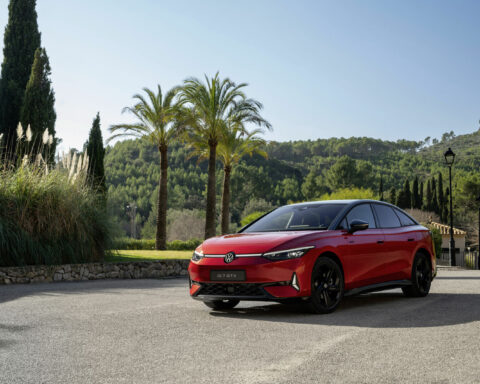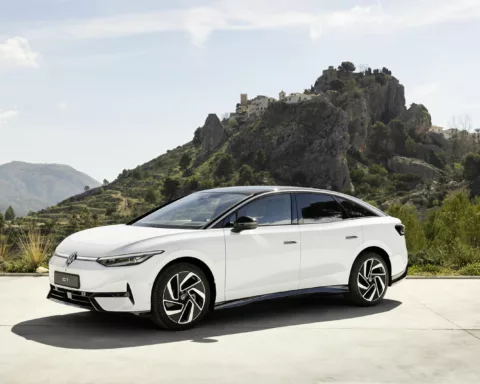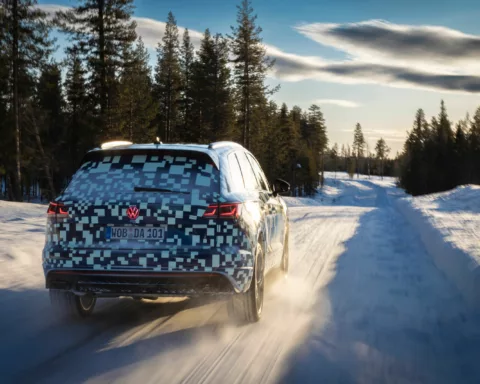“The climate crisis is the greatest challenge of our time,” says Herbert Diess, CEO of the Volkswagen Group. Volkswagen was the first automaker to commit to the Paris climate agreement back in 2018. By 2050, the company aims to be balance sheet CO₂ neutral. This dossier explains the efforts Volkswagen is making to protect the climate in many areas: in its products, in production and together with partners.
Our products: The future drives electrically
An important contribution to effective climate protection is the shift to e-mobility. A large number of scientific studies show that battery-powered electric cars have the best climate footprint of all drive types. One of these studies was jointly presented by three renowned research institutes in 2020: the Mercator Research Institute on Global Commons and Climate Change (MCC), the Potsdam Institute for Climate Impact Research (PIK) and the Paul Scherrer Institute (PSI). Key message: the climate advantage of e-cars has grown significantly in recent years.
Reasons include advances in battery production, longer battery life and the higher share of renewable energy in Europe. “Compared to combustion engines, the production of e-cars still requires more energy. But that balances out after a few tens of thousands of kilometres, as long as clean electricity is used for charging,” says PSI researcher Christian Bauer.
ꁅꁄ
Volkswagen Group wants to become the global market leader in e-mobility and is investing a total of 35 billion euros in it by 2025. The e-offensive has already begun: in 2020, the Group brands delivered 231,600 fully electric vehicles, more than three times as many as in 2019. Plug-in hybrids (PHEVs) were also very popular, with 190,500 vehicles (+175 percent).
The strong growth continues for electric models in 2021: by the end of September, 293,100 BEVs had been delivered worldwide, more than twice as many as in the same period of the previous year (+138 percent). There was also continued high demand for plug-in hybrid drive vehicles. A total of 246,000 PHEVs were delivered in the first nine months (+133 percent).
By 2030, the Volkswagen Group will introduce around 70 fully electric models to the market and production is already underway for around 20 of these. In addition, by the end of the decade there will be around 60 hybrid vehicles in the product portfolio, of which just over half are already in production. The Modular Electric Drive Matrix (MEB) forms the technical and economic backbone of the e-offensive. The vehicle architecture, conceived specifically for the electric drivetrain, provides long range, plenty of interior space and outstanding performance.
Volkswagen’s e-offensive not only includes cars – but also climate-friendly electricity for the usage phase. When charging at home, customers can “fill up” with Volkswagen Naturstrom from the Group subsidiary Elli. The principle: for every kilowatt hour consumed, the same amount of electricity is fed into the grid from renewable sources such as wind power, solar energy or hydropower.
On the road, IONITY’s fast-charging stations offer 100 percent green electricity. With the IONITY joint venture, several automotive companies, including Volkswagen Group, are driving the expansion of charging infrastructure on Europe’s main roads.
By 2025, Volkswagen is aiming to operate around 18,000 rapid-charging locations across Europe in conjunction with partners. This corresponds to a fivefold increase in the size of the rapid-charging network as compared to today, and around one third of the total demand forecast for the continent by 2025. Volkswagen is also expanding the public rapid-charging network in North America and China. Electrify America is aiming for around 10,000 rapid-charging locations in the USA and Canada by the end of 2025. In China, Volkswagen intends to establish a total of 17,000 rapid-charging locations by 2025 with the CAMS joint venture.
Our production: More efficiency – less CO₂
The Volkswagen Group is focusing on increased energy efficiency and reduced emissions in factories. The aim is to provide all European locations with 100 percent of their power from renewable energy by 2023, having already reached a level of 95 percent. The locations in Brussels, Dresden, Crewe, Zwickau, Győr, Sant’Agata Bolognese, Molsheim and Zuffenhausen are already carbon-neutral.
Take Brussels, for example: the production plant for Audi’s all-electric e-tron series has already been using green electricity since 2012. There is also a photovoltaic system with a total area of 107,000 square metres on the rooftop of the plant. The second pillar alongside climate-friendly electricity is the supply of heat from renewable energies. The company offsets CO2 emissions that cannot currently be avoided with carbon credit projects.The all-electric ID.4 leaves the Zwickau plant with a CO₂-neutral balance sheet.
Zwickau as an example: in the factory in Saxony, the Volkswagen ID.32 and ID.43 models are net carbon-neutral as they roll off the line. The principle is to avoid energy consumption, use renewable energies and compensate for unavoidable emissions. An important contribution is made, for example, by green electricity from hydroelectric power plants, wind farms and solar parks, which the plant obtains from Volkswagen Kraftwerk GmbH. The site covers the remaining demand with its own combined heat and power plant. This is powered by natural gas, which is significantly more climate-friendly than generating electricity from coal. In addition, the highly efficient combined heat and power plant covers 70 percent of the heat requirement.
The Volkswagen Group is also focusing on climate-friendly solutions in logistics. Since 2020, battery transport for the ID.3 and ID.4 has been carried out by rail and, for the last mile, by e-truck. The green logistics chain is expected to reduce CO2 emissions by around 11,000 tons per year. This corresponds to the annual CO2 emissions of a town with more than 1,000 inhabitants.
For parts of its new car shipments on European sea routes, Volkswagen uses certified fuel made from vegetable residues. The fuel is obtained from used oil from the catering and food industries, for example. This reduces CO2 emissions from car carriers by more than 85 percent.
Our partners: Transparency in the supply chain
The Volkswagen Group not only focuses on climate-friendly production, but also assumes responsibility for the supply chain. In 2019, for example, the company established a sustainability rating system in which business partners around the world are assessed for risks relating to human rights, environmental protection and corruption. A comprehensive transparency system also makes it easier to identify other risks along the supply chain. The system covers sub-suppliers, refineries, smelters, mines as well as recycling companies and was designed together with RCS Global, a specialist agency for supply chain analysis. The focus is on 16 raw materials, including the battery raw materials cobalt, lithium, graphite and nickel.
In the “Cobalt for Development” initiative, Volkswagen is working with other companies to improve micro-mining in the Democratic Republic of Congo. The southern Congo is home to 70 percent of the world’s cobalt deposits. The raw material is an important starting material in the production of batteries. The pilot project aims to improve health and safety conditions as well as the living conditions of people in the surrounding communities. The Volkswagen Group has also teamed up with partners to initiate the “Responsible Lithium Partnership”, advocating for responsible handling of natural resources such as lithium in Salar de Atacama, Chile.
In the future, Volkswagen will recycle most of the raw materials used from high-voltage vehicle batteries. This will be particularly relevant when there are likely to be larger quantities of battery returns from the end of the 2020s. The aim is to achieve a recycling rate of more than 90 percent for raw materials such as lithium, nickel and cobalt. Volkswagen Group Components already operates a pilot plant in Salzgitter that recycles up to 3,600 battery systems a year.
On course for Paris climate targets
The independent Science Based Targets Initiative confirmed in 2020 that Volkswagen Group’s climate targets meet the terms of the Paris Climate Agreement. The Group’s plans call for a 30 percent reduction in CO2 emissions in production and vehicle use worldwide by 2030 compared to 2018. This is in line with the requirement to limit global warming to well below two degrees Celsius.
Volkswagen is not along in focusing on protecting the climate, but is working with other companies in the European CEO Alliance. The members generate total annual revenue of 600 billion euros and employ 1.7 million people. They support the Paris climate targets and the EU Green Deal. The Alliance unites business leaders from the energy, transport and technology sectors. The proposals made by the CEOs include significant CO2 pricing signals, swift decarbonisation measures for mobility and transport, the transformation of the building sector and rapid restructuring and renewal of the energy system in all EU member states.
Advisors in the transformation to a climate-neutral company include the members of the independent Sustainability Council. In 2020, Volkswagen extended its cooperation with experts from politics, business and science by two years. The spokesman for the advisory board is Georg Kell, founding director of the United Nations Global Compact, the largest voluntary corporate sustainability initiative. He says: “The transformation at Volkswagen is fundamental for the German and European economy. It is important to me that Volkswagen rediscovers itself and steers forward. The best thing Volkswagen can do for climate protection is to






